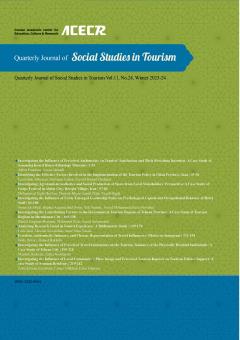تأثیر محدودیت ها و موانع ادراک شده گردشگری بر تمایل معلولان جسمی به گردشگری (حوزه مطالعه: شهر تهران)
محورهای موضوعی :
مائده هاشمی
1
,
زهرا نادعلی پور
2
![]()
1 - کارشناس ارشد برنامه¬ریزی توسعه گردشگری، دانشکده علوم گردشگری، دانشگاه علم و فرهنگ، تهران
2 - استادیار گروه مدیریت گردشگری، دانشکده علوم گردشگری، دانشگاه علم و فرهنگ، تهران
کلید واژه: گردشگری, محدودیت های ادراک شده گردشگری, نظریه درماندگی سلیگمن, معلولین,
چکیده مقاله :
از دیرباز مطالعه محدودیت ها در زمینه فراغت مطرح بوده است، ولی اخیراً تحقیقات دانشگاهی که به بررسی این محدودیت ها در حوزه گردشگری و معلولان می پردازند، رو به فزونی است. اگر چه با وجود این رشد، تحقیقات صرفاً به شناسایی و تبیین موانع و محدودیت ها پرداختهاند؛ لذا، برخلاف تحقیقات مشابه داخلی، تحقیق حاضر با رویکردی متفاوت سعی دارد تا موضوع را از زاویه دیگری بررسی نموده و تأثیر این محدودیت ها را در جامعه هدف مورد بررسی قرار دهد؛ لذا با اقتباس از تحقیق لی و همکاران (2012)، هدف اصلی این تحقیق مطالعه تأثیر محدودیت ها و موانع ادراک شده گردشگری بر تمایل معلولان جسمی شهر تهران به گردشگری با رویکرد نظریه درماندگی سلیگمن است. تحقیق پیش رو از لحاظ هدف از نوع تحقیقات کاربردی و با رویکرد توصیفی- تحلیلی از نوع همبستگی است. داده های موردنیاز از طریق پیمایش و با ابزار پرسشنامه محقق ساخته جمع آوری شد. جامعه آماری پژوهش کلیه معلولین جسمی حرکتی، ضایعه نخاعی و جانبازان در شهر تهران بودند و با روش نمونه گیری در دسترس تعداد 383 نفر انتخاب شدند. نتایج پژوهش نشان داد محدودیتهای گردشگری ادراک شده از سوی افراد معلول، تمایل آنان به گردشگری را تحت تأثیر قرار می دهد. از سوی دیگر، این محدودیت ها بر درماندگی آموخته شده آن ها تأثیر مثبت دارد. و نهایتا اینکه درماندگی آموخته¬شده از سوی افراد معلول، تمایل آنان را به گردشگری تحت تأثیر قرار می دهد. نتایج پژوهش حاضر می تواند از سوی نهادهای مربوطه همچون شهرداری ها و سازمان های مسئول در حوزه مدیریت شهری و نیز نهادهای متولی امور معلولین، مورد بهره¬برداری قرار گیرد.
While leisure limitations have long been the subject of research, there has recently been a growing trend in academic studies that examine such limitations in terms of tourism and disability. However, as those studies are merely limited to the identification and elaboration of the barriers and limitations., the current study sought to investigate the influence of such limitations on the target population. Therefore, based on the study conducted by Lee et al. (2012), the current study set out to investigate the effect of perceived travel limitations on the tourism tendency of physically disabled individuals living in Tehran, Iran, using Seligman's Helplessness Theory. The required data for this applied, descriptive-analytical correlational study was collected through a survey using a researcher-developed questionnaire. The statistical population of the study comprised all physically disabled people, those suffering from spinal cord injury, and war-disabled individuals living in Tehran, out of whom 383 people were selected as the sample size using the convenience sampling method. The findings of the study indicated that tourism limitations perceived by the disabled residents of Tehran did not significantly affect their tourism tendencies. On the other hand, the perceived tourism limitations exerted a positive influence on their learned helplessness. Finally, the learned helplessness of people with disabilities negatively affected their intention to travel. The results of the present study can be used by relevant institutions such as Tehran's municipality, those responsible for urban management, and institutions in charge of the affairs of disabled people.
